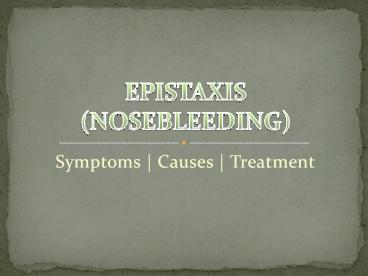Epistaxis(Nosebleeding): Causes and Treatment - PowerPoint PPT Presentation
Title:
Epistaxis(Nosebleeding): Causes and Treatment
Description:
Nosebleeds can be dramatic and frightening. Luckily, most nosebleeds are not serious and can be handled fairly easily. They are divided into two types, depending on whether the bleeding is coming from the anterior (front of the nose) or posterior (back of the nose). – PowerPoint PPT presentation
Number of Views:802
Title: Epistaxis(Nosebleeding): Causes and Treatment
1
EPISTAXIS (NOSEBLEEDING)
- Symptoms Causes Treatment
2
Introduction to Epistaxis
- Bleeding from nostril, nasal cavity or
nasopharynx is called Epistaxis (Nosebleeding). - Most often self limited, but can often be serious
and life threatening. - 5-10 of the population experience an episode of
epistaxis each year, 10 of those will seek a
physician and 1 of those will need a specialist. - Fairly common, is seen in all age groups.
3
Causes of Epistaxis
- Excessive nose blowing and picking
- Injury to the nose or face
- Dry, warm air, commonly found indoors during the
winter - Inserting foreign object into the nose
- High blood pressure
- Deviated septum
- Facial and nasal surgery
- Tumors
- Bleeding disorders
- Use of certain medication and drugs
4
Symptoms of Epistaxis
- Signs of excessive blood loss include dizziness,
light-headedness, confusion, and fainting. - Additional bleeding from other parts of the body,
such as bleeding gums when brushing teeth, blood
in urine or stool, or easy bruising may indicate
an inability of the blood to clot.
5
Daignosis of Epistaxis
- Laboratory investigations are not usually
necessary, although they may be required in
certain specific circumstances - Haematocrit or FBC is obtained if there is a
concern about anemia from excessive blood loss or
clotting abnormality - Coagulation studies are required in the presence
of atypical persistence, recurrence, or
recalcitrance to treatment. - Urea, serum creatinine, and LFTs are usually only
performed if there is a concern about the
patients general medical condition.
6
Treatment of Epistaxis
- If you are bleeding from the front of your nose,
begin by trying the following first-aid
measures - Sit up (so your head is above the level of your
heart), lean forward slightly and breathe through
your mouth. - With your thumb and index finger, pinch the
entire front of your nose (just above your
nostrils and below the hard, bony base) and hold
for five minutes. - At the same time, use your other hand to apply an
ice pack or a plastic bag of crushed ice to the
bridge of your nose to slow blood flow. - After you have pinched your nose for five
minutes, release it to see if your nose is still
bleeding. Keep the ice pack on for another 10 to
15 minutes.
7
Countinue Treatment of Epistaxis
- If your nose is still bleeding, pinch it for an
additional 10 minutes. - Release your nose again. If you are still
bleeding, seek emergency medical help - When simple first aid does not stop a nosebleed,
your doctor may treat the problem by - Applying medication directly to the inside of
your nose to stop the bleeding - Sealing off (cauterising) the injured blood
vessel with a chemical, such as silver nitrate,
or with an electric probe - Packing your nose with gauze or a sponge
8
Prevention of Epistaxis
- Most nosebleeds occurs during the winter in cold,
dry climate. If one is prone to nosebleeds,
he/she should use a humidifier in his home. We
should use petroleum jelly (Vaseline), over the
counter nasal lubricant spray, or a saline nasal
spray to keep nasal passage moist. - Avoid picking the nose or blowing the nose to
vigorously. - Do not strain when bending or lift anything too
heavy - Stop smoking. Smoking contributes to nasal
dryness and irritation. - If the nosebleed related to other medical
conditions, such as liver disease or a chronic
sinus condition occurs, follow doctors
instruction to keep that problem under control.































